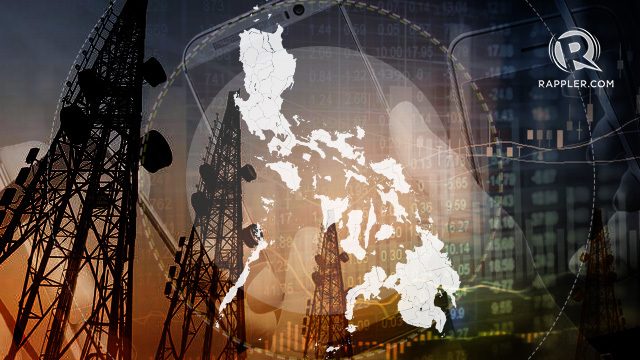SUMMARY
This is AI generated summarization, which may have errors. For context, always refer to the full article.

MANILA, Philippines – Opposition lawmakers slammed a soon-to-be approved House bill that would allow foreigners to gain full ownership of public utilities like telecommunication and transportation companies in the country.
Albay 1st District Representative Edcel Lagman said on Thursday, February 20, that House Bill (HB) No. 78 – which only needs a 3rd and final reading to hurdle the lower chamber – violates the 1987 Constitution.
Lagman, which has opposed the measure since the 17th Congress, said HB 78 is “fatally violative of the Constitution as it allows traditional public utilities like transportation and telecommunication companies to be owned by aliens or corporations which are wholly owned by foreigners.”
Section 11, Article XII of the 1987 Constitution currently reserves the ownership, operation, control, and management of public utilities to Filipino citizens or to corporations or associations, and at least 60% of its capital stock showed by owned by Filipinos.
But HB 78 seeks to amend the Commonwealth Act No. 146 of the “Public Service Act” that would give a distinction between a public service and a public utility.
Under the bill, a public service would be defined as every person who may own, operate, or control in the Philippines “services which are non-rivalrous or imbued with public interest” such as:
- Marine repair shop
- Wharf or dock
- Canal
- Public market
- Irrigation system
- Gas
- Electric light
- Heat and power
- Water supply and power
- Petroleum
- Sewerage system
- Telecommunications system
- Wire or wireless communication system
HB 78 then defines a public utility as any person or entity that operates, manages or controls for public use the distribution of electricity, transmission of electricity, water pipeline distribution, and sewerage pipeline.
But HB 78 not only makes a distinction between public services and public utilities, but also leaves out the 60-40 rule on foreign ownership.
House committee on economic affairs chair Sharon Garin previously said HB 78 would help improve the “deplorable state” of the Philippines’ public services by giving more leeway for foreign direct investments.
Lagman disagreed, arguing that public services and public utilities should be “interchangeable.”
“It is well-settled that public service is an indispensable attribute or element of a ‘public utility,’ and the two are synonymous and interchangeable, so much so that there is no sound reason for making a distinction to justify defiance of the Constitution by allowing the non-compliance of ‘public service’ enterprises with the requirement of Filipino citizenship,” said the opposition congressman.
Deputy Minority Leader Carlos Zarate also finds it “ironic” for the House push for HB 78, when President Rodrigo Duterte’s government is out to shut down media network ABS-CBN for alleged foreign ownership.
“It is tragically ironic that while the Duterte administration is questioning the Philippine depository receipt of ABS-CBN, its allies in Congress are pushing for the 100% foreign ownership of key public utilities like telecommunications, transportation and energy,” Zarate said in a statement.
“If these amendments get through we would see our public services turned into super-profit generating, 100% foreign-owned enterprises. We would be fully at their mercy,” added the Bayan Muna lawmaker.
‘Shortcut’ to charter change
Gabriela Women’s Party Representative Arlene Brosas said if HB 78 becomes law, the Duterte administration would be selling out the Philippines to foreign powers.
“Sinasagad ng rehimeng Duterte ang pagbebenta sa halos lahat ng serbisyo publiko sa malalaking dayuhang negosyante sa ilalim nitong amyenda sa Public Service Act. Kulang na lang ay tahasang ipamigay ‘nya ang mga lupain at lahat ng serbisyong dapat ay nasa kontrol ng gobyerno,” Brosas said in a statement.
(The Duterte regime is all-out in selling almost all public services to big foreign businessmen under these proposed amendments to the Public Service Act. It’s one step away from completely giving away all lands and services that should be under the government’s control.)
She also hit HB 78 for forcing to amend the Constitution via legislation, when it only allows 3 modes to change it: Constitutional Convention, Constituent Assembly, and People’s Initiative.
“Shortcut ito sa Cha-Cha (charter change) habang kasalukuyang tinatalakay sa komite ang mas komprehensibong pagbabago sa Konstitusyon (This is a shortcut to charter change while the committee currently tackles comprehensive amendments to the Constitution),” Brosas said.
HB 78 is not the only bill being pushed in the House seeking to ease restrictions on foreign investments in the Philippines. (READ: [ANALYSIS] The real score on foreign direct investments)
Several bills and resolutions aimed at amending parts of the Constitution are likewise pushing to lift the constitutional restrictions on foreign investments – either by completely removing the 60-40 rule or by giving Congress the power to pass a law that would allow this. (READ: Business groups in favor of easing restrictions on foreign investments)
In 2019, the House already passed a bill that would allow foreigners to practice their professions in the Philippines. – Rappler.com
Add a comment
How does this make you feel?
There are no comments yet. Add your comment to start the conversation.